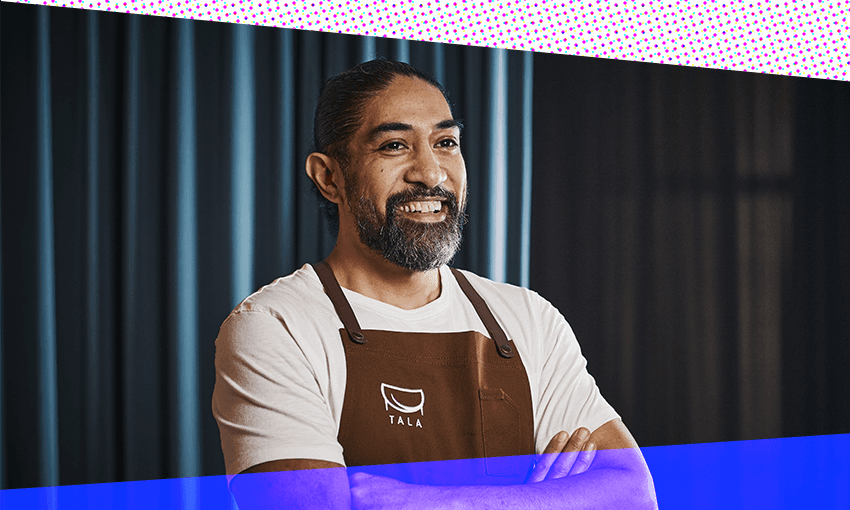An Auckland restaurant opening soon is taking a fine dining approach to traditional Sāmoan kai. The couple behind Tala talk to Charlotte Muru-Lanning.
This is an excerpt from our weekly food newsletter, The Boil Up.
It’s lunch time in the South Auckland suburb of Ōtāhuhu. More specifically, it’s lunchtime at Sāmoan eatery Polynesian Taste on Ōtāhuhu’s main drag, where I’m joined by Henry Onesemo (ex-Meredith’s, Apero and East St Hall) and his wife Debby Onesemo. They are about to open their first restaurant, Tala, dedicated to contemporary Sāmoan cuisine, on the site of the now-closed Parnell restaurant Pasture.
We’re exceptionally well-provisioned for lunch today. Our table is groaning with traditional Sāmoan fare: sapasui, palusami, kale moa, taro, plates piled high with lamb and fried fish. Other diners trickle in and out for takeaways or gather around tables for kai and conversation. Adding to the atmosphere is the magnificently thunderous music playing from the nearby restaurant speakers.
Sāmoan eateries like this – open during the day and specialising in economically priced traditional kai – aren’t necessarily common all over Tāmaki Makaurau, but where they are concentrated, in the suburbs of West and South Auckland, they’re bustling institutions.
There’s a tendency to describe food like this – and that which will be served at Tala – as “Polynesian” or “Pacific”. And while some chefs find liberation in those unspecific definitions, Henry Onesemo is unapologetic about the culinary specificity of Tala: it’s Sāmoan through and through.
“The goal was always to open a Sāmoan restaurant,” he says. “I just want Sāmoa to do its own thing and secondly, I want other Polynesian groups to do their own thing – imagine a Tongan restaurant, a Niuean restaurant, a Cook Island restaurant.”
And to him that specificity is political, a counter both to the romanticised picture of the Pacific as a whole and to the losses caused by this sort of cultural flattening. “There is a time to group us all together, but not every time,” he says. Taking ownership of what Sāmoan food means, and celebrating its distinctiveness, is about reclaiming sovereignty, both cultural and culinary.
Born in American Sāmoa, Henry grew up there and moved to the US as a 17-year-old where he worked as a Disney lūʻau dancer and in the military. Debby, who was born in Florida, was working as a lawyer when the two met. The husband and wife team shifted to Aotearoa almost a decade ago after a stint in Sāmoa, where Henry trained as a chef. It was a meal at Sāmoan-born chef Michael Meredith’s trailblazing restaurant Meredith’s during a weekend trip to Auckland in 2014 that sparked the move. The pair had already envisioned opening a restaurant in Sāmoa but that meal changed everything, they say. Immediately after the meal, Henry recalls, “I looked at [Debby], and she saw the look and knew straight away that we were gonna move to New Zealand.”
After writing to Michael Meredith following that transformative meal, Henry began working in Meredith’s kitchen that same year. Henry later moved to Apero on Karangahape Road and then spent time in Thailand at Michelin-starred Gaa in Bangkok. In 2019 he returned to New Zealand, and to Karangahape Road, to work as head chef at East St Hall. And now he and Debby are embarking on a new adventure with Tala. “Nobody says opening a restaurant is easy, but I feel like it’s been easy for me to open up a restaurant because of what people have done before us,” he says. “I owe a lot of gratitude and respect to people like Michael that have come before me and who have carved that space out.”
This afternoon, the Onesemos are taking a break from the chaos of construction, plate and cutlery selection, hiring and paperwork for what will be a modern, dimly lit space with 28 seats. And while Tala and Polynesian Taste are intrinsically linked by the whakapapa of their food, they’re also worlds apart.
The couple held a series of sell-out pop-up dinners at central Auckland’s Bar Magda earlier this year where they workshopped the contemporary takes on Sāmoan cuisine that you’ll find on the menu at Tala. Diners there can expect spatchcocked chicken wrapped in banana leaves with herbs and citrus, cooked in the hot stones of the umu; a dish inspired by childhood snacks of raw ramen, taro and banana chips; and an abstracted take on Wattie’s Mixed Veg.
Henry points to our now half-eaten bowl of sapasui on the table – a tangle of extremely savoury vermicelli pearled with vegetables and hunks of pork akin to chop suey – and opens a photo on his phone of his interpretation of the dish he grew up with. Visually, his version is exquisite, finished with a dusting of herbs, mint, coriander, parsley, lemon juice, garlic – “almost like a verde” – and puffed grains as a nod to the familiar texture of cartilage he grew up with. For anyone well-versed in fine-dining, the plate will look rather unsurprising. For anyone who grew up feasting on sapasui at home, Henry’s version might seem sacrilegious. Those are the tensions that come with representing a food less familiar to the mainstream, and the expectations of those whose culture is intertwined with the food. But to Henry, “this is about telling a version of a story of what Sāmoan food could be.”
He doesn’t shy away from potential accusations about his approach, either. “The look of the food is pretentious,” he says. “And purposefully so – pretension helps things grow.”
Tala opens in early November at 235 Parnell Road, Auckland.





